Rasmalai is yet another one of my favorite sweets. This Bengali specialty is made with rasgulla (sweetened balls of paneer) soaked in sweetened, thickened milk that has been scented with cardamom and saffron. The result is a creamy, dreamy dessert that absolutely melts in your mouth. Make this soft and tasty Rasmalai recipe with my easy step-by-step photos.
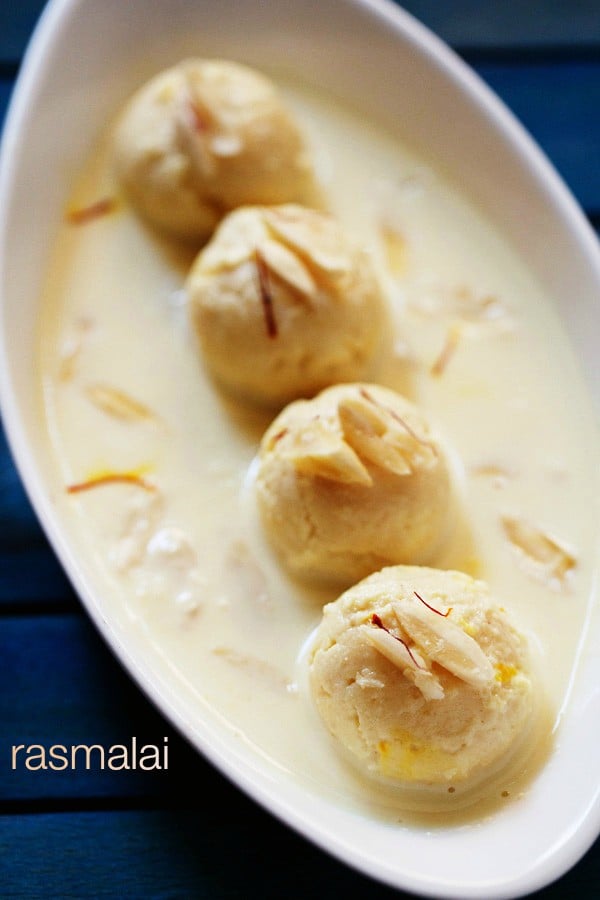
About Rasmalai
Also spelled ras malai, rasa malei, or rossomalai, this delicious dish is beloved all over the Indian subcontinent. Rasmalai is known to have its origin in Bengal. It is a favorite dessert amongst many Indians, known for its rich and indulgent flavors.
Rasmalai is a combination of two Indian sweets, rasgulla or flattened chenna balls soaked in sweetened thickened milk with clotted cream layers, called rabdi.
Ras means “juice” or “juicy”. Malai means “cream” and refers to the thickened milk filled with clotted cream. This creamy thickened and sweetened milk is also known as Rabdi or Rabri). This says a lot about this yummy recipe – it is milky, creamy and downright delectable.
Making Rasmalai recipe at home is not difficult, even if you make them entirely from scratch. Start by making some of my Rasgulla a day or two before, and then later make the Rasmalai with the thickened milk.
Table of Contents
Dividing work this way makes it easy. If you’re feeling short on time, you can absolutely use store bought rasgulla instead of homemade.
The recipe of thickened sweet milk or rabdi is made using the traditional method of reducing milk and thus tastes authentic like the Rasmalai served in the Indian sweet shops.
While Rasmalai is enjoyed across India, there are numerous ways to prepare it across different regions. For example, in Bengal, it is known as ‘rossomalai’ and is often made with chenna (curdled milk) instead of paneer or ricotta cheese, giving it a lighter texture and milder flavor.
Rasmalai is usually served chilled and simply garnished with some chopped nuts and saffron threads. While serving, set out the dish of leftover thickened milk with the Rasmalai.
Today, chefs and even home cooks come up with modern, experimental ways of the traditional Rasmalai recipes. Rasmalai cake, Rasmalai ice cream, or Rasmalai cheesecake are some innovations, which combine the classic with contemporary.
How to make Rasmalai
Preparation
This recipe is pretty simple, and I can’t wait for you to try it!
1. To make Rasmalai, you will need 12 to 15 rasgulla. You can either make them at home or you can use store bought ones.
My detailed step-by-step post on How to make Rasgulla, is an excellent primer for those of you who wish to cook entirely from scratch.
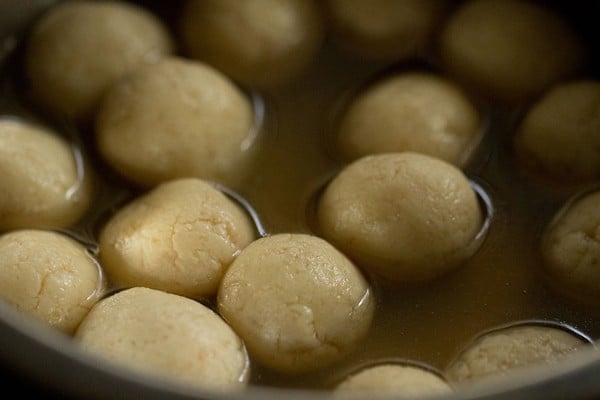
2. Boil ½ cup water, then add 10 to 12 almonds. Cover and keep aside for 30 to 40 minutes.
Note: Usually both almonds and pistachios are added, but I had run out of pistachios, so I just used almonds. You can add about 10 to 12 each of the almonds and pistachios.
Remember to also blanch the pistachios if using them.
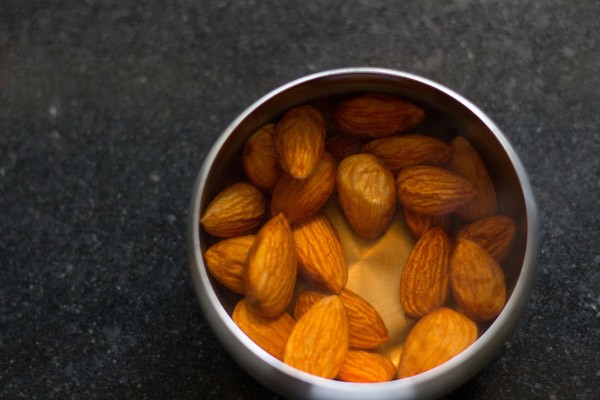
3. After 30 minutes, peel the almonds and slice them thinly. Set aside.
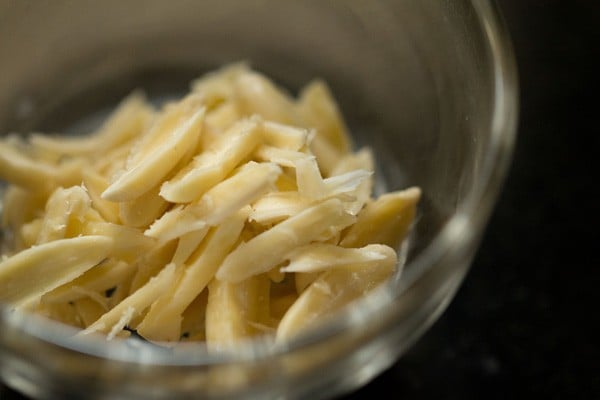
Make Rabri
4. While the almonds are blanching, take 1 liter of full fat whole milk in a thick bottomed pan or kadai.
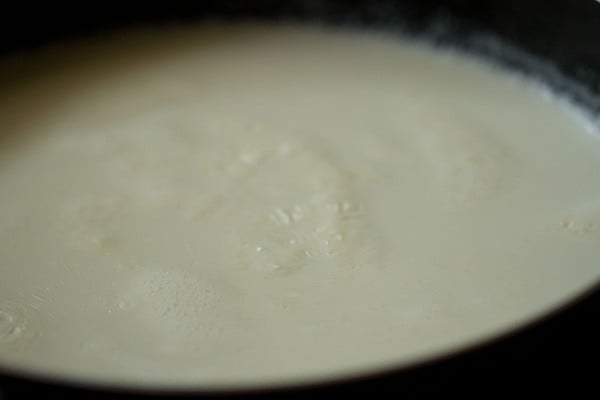
5. Bring the milk to a boil on medium heat.
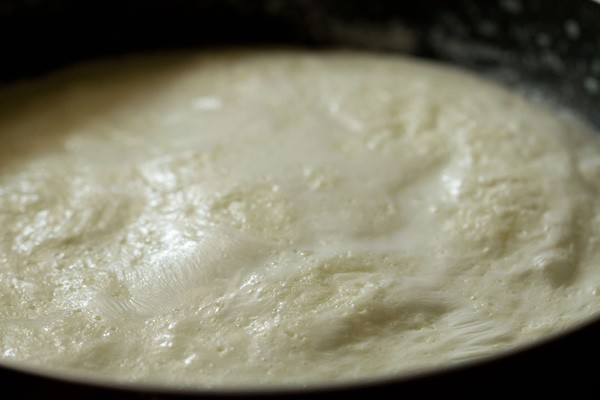
6. While the milk is coming to a boil, take 2 tablespoons of warm milk from the pan and add it to a small bowl. Add 8 to 10 saffron strands. Stir and keep aside.
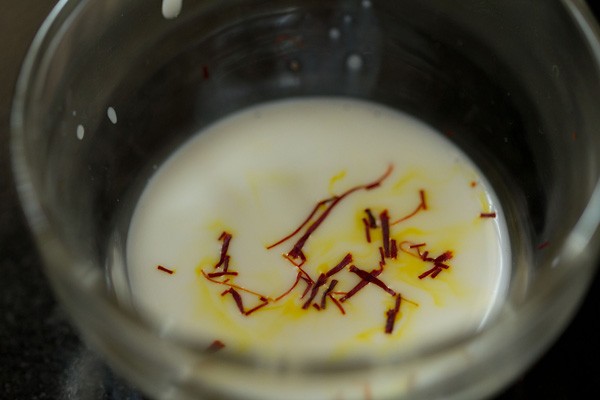
7. Once the milk has come to a boil, lower the heat and simmer the milk. Collect the floating cream and push it to the sides of the pan using a spoon or spatula.
Continue to cook this way until the milk is reduced to half.
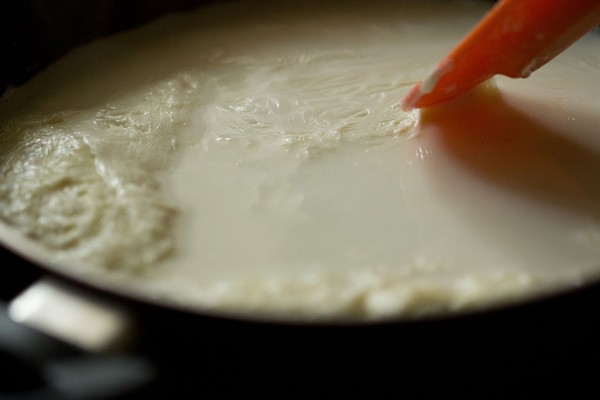
8. Keep on collecting the cream which floats on the top and move it to the sides. Also keep stirring the milk at intervals so that the milk does not scorch.
This process of reducing the milk will take about 20 to 25 minutes after the first boil on a low to medium heat.
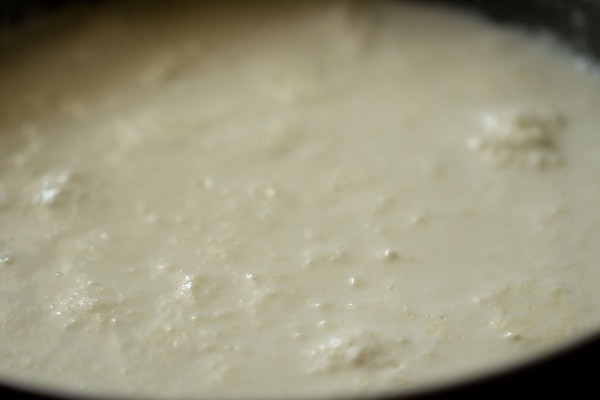
9. Once the milk has reduced to half of its original volume, add 4 to 5 tablespoons of sugar, or according to your taste.
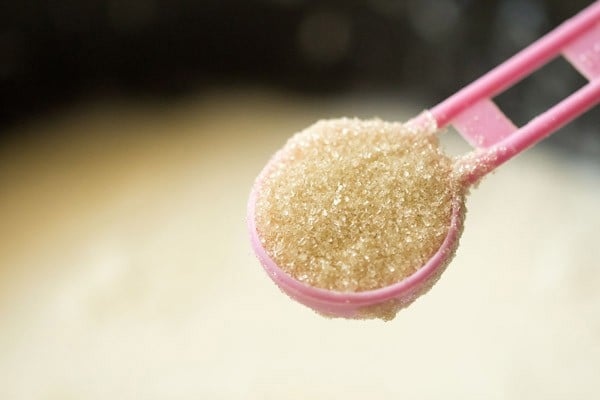
10. Mix well so that the sugar dissolves. Scrape the milk solids from the sides and reincorporate them into the simmering milk.
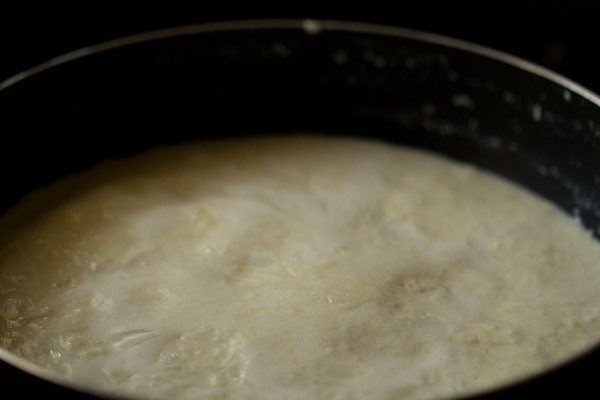
11. Add ½ teaspoon green cardamom powder.
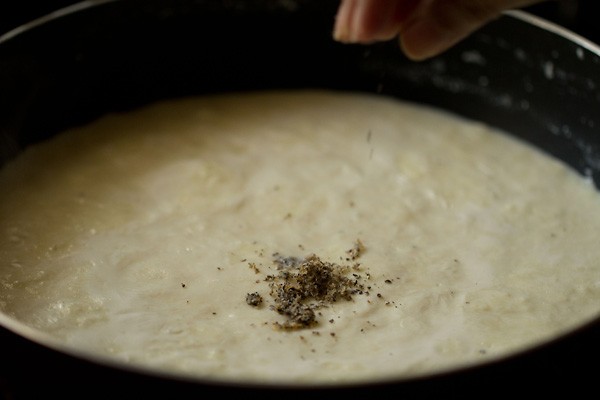
12. Add most of the sliced almonds (and pistachios if you have used them), reserving a few for garnish.
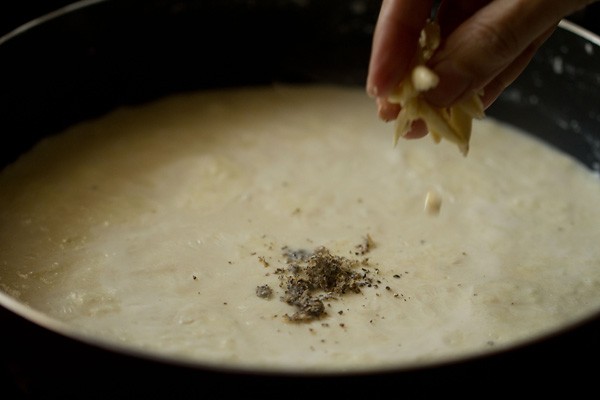
13. Also add the saffron dissolved milk.
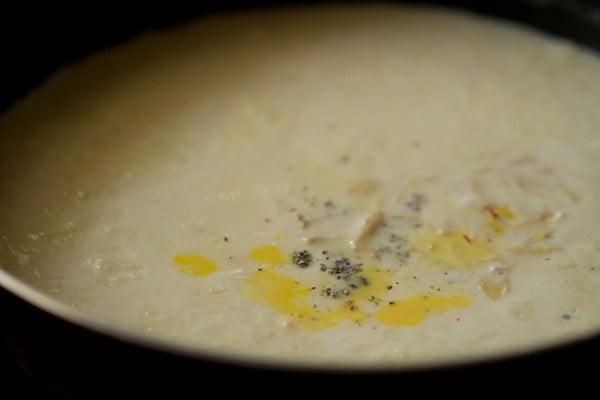
14. Stir to incorporate. Keep simmering the reduced milk at a low heat and stir occasionally. Check the taste and add more sugar if required.
I usually do not thicken the milk quite to Rabri consistency, as the rasgullas need to soak some of the sweetened milk. Just reduce the milk till it’s roughly half of its original quantity.
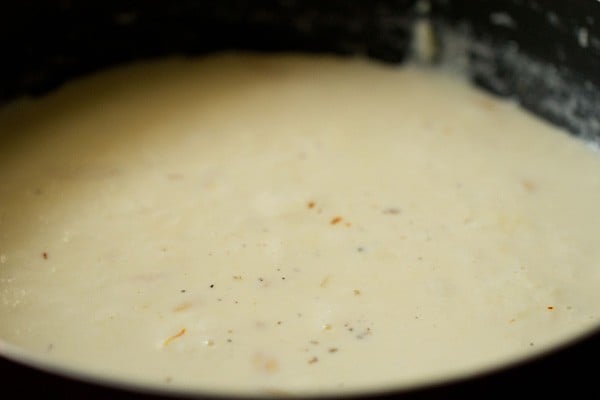
Make Rasmalai
15. Take each rasgulla and gently apply pressure with a spatula so the sugar syrup is removed from it. You can also press and squeeze the rasgulla in your palms.
Be gentle and don’t apply too much pressure, as the rasgulla will break. There should be no sugar syrup in the rasgulla.
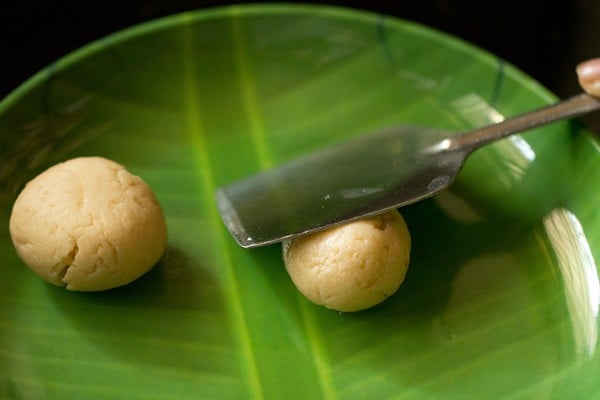
16. Press all the rasgulla balls this way.
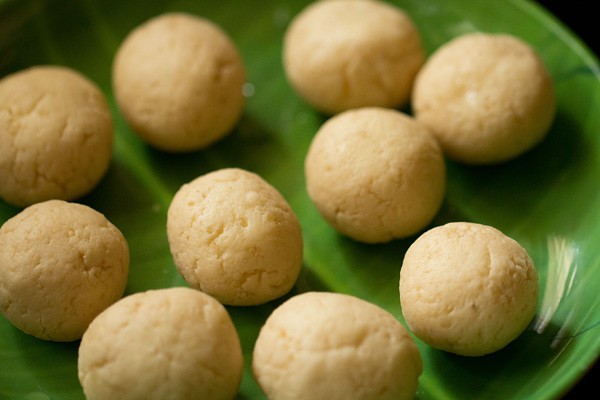
17. Now place the squeezed rasgullas in the simmering milk.
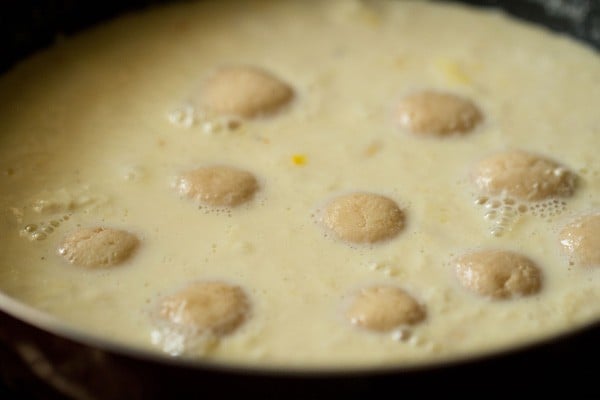
18. Simmer for 2 to 3 minutes on low heat. You can omit this step and simply place the rasgulla in the prepared rabdi.
But they will be more juicy and flavorful if you let them simmer for a couple of minutes.
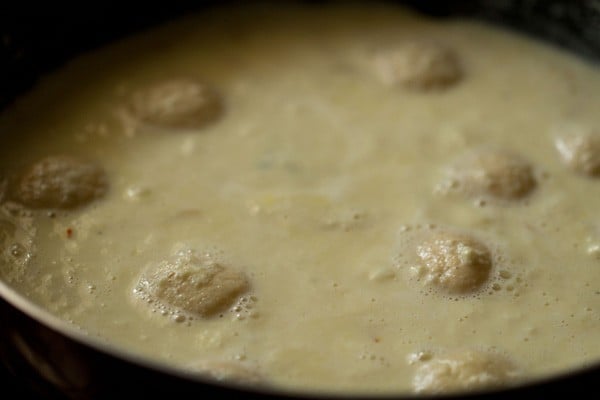
19. Turn off the heat and add 1 to 2 teaspoons of either rose water or kewra water (pandanus water).
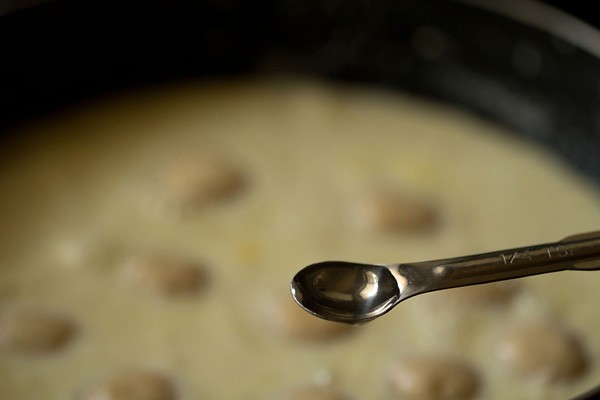
20. Stir gently. Cover and let the rasmalai come to room temperature, then chill thoroughly in the fridge in a covered bowl or container.
Serve rasmalai garnished with some sliced almonds or pistachios and saffron strands. You can also serve rasmalai warm or at room temperature if you prefer. Enjoy!
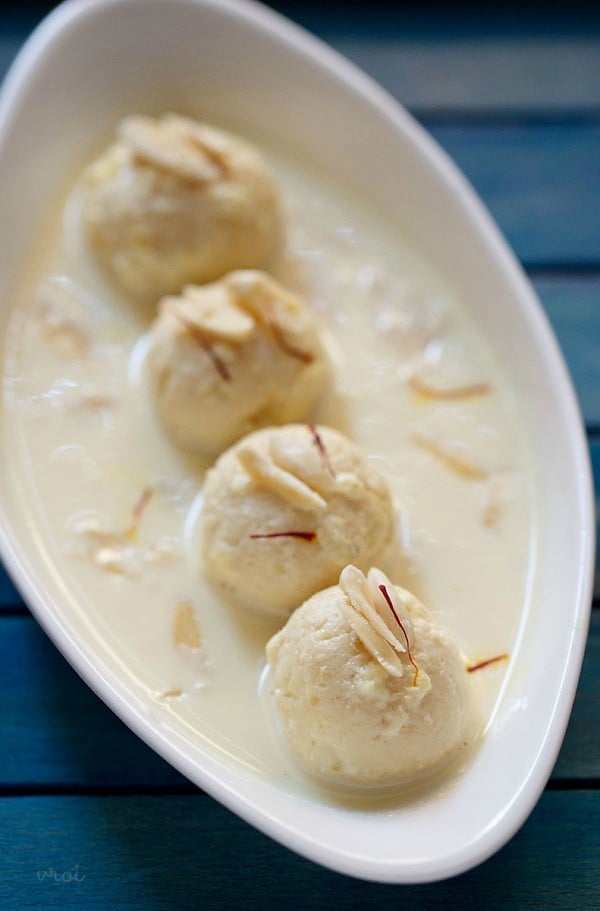
Expert Tips
- Rasgulla: If you plan to make the rasgulla then make sure to use whole milk. My comprehensive and detailed post of Rasgulla Recipe will help you to make these cottage cheese balls easily. Remember to flatten the balls to a thick or medium-thick patty like shape before you boil them in the sugar syrup.
- Rabdi: To make the rabdi or the liquid base of this sweet, use whole milk or full fat milk to get the clotted cream or malai. Skimmed milk or toned milk simply won’t give you the same results. You can use pasteurized and homogenized milk.
- Nuts: While almonds and pistachios are the nuts that are always added, you can opt for nuts like cashews and pine nuts. Blanching the nuts does change their texture and makes them taste better. Omit the blanching to save time an extra step if you prefer while making this Rasmalai recipe. Ensure that you do not use salted nuts.
- Flavorings: Saffron, rose water, kewra water (pandanus water) and cardamom powder are the classic Indian flavorings included in most sweets. Feel free to skip any one if you don’t have. Instead of rose water and kewra water, add one to two drops of edible rose essence or kewra essence.
FAQs
You are certainly welcome to just let the rasgulla soak in the sweetened milk sauce, but they will take on more flavor and more juiciness if you give them some time to simmer.
It will last for 2 to 3 days in the fridge, and can be used for making roti, in rice based dishes, added to soups or lentils.
Absolutely! They’ll last for 2 to 3 days in the fridge, so I recommend preparing them a day or two in advance of when you want to serve them.
Drink it! It is sweet and delicious.
Rasmalai is made by soaking or cooking rasgulla in thickened milk for a few minutes. The rasgulla balls absorb the flavor of the sweetened flavored milk and becomes soft.
These soft balls are served together with the sweetened thickened milk. For rasgulla the chenna balls (cottage cheese balls) are cooked in sugar syrup. Once they cooked through and become spongy, they are served with the sugar syrup and not thickened milk.
More Indian Sweet Recipes To Try!
Sweets Recipes
Sweets Recipes
Sweets Recipes
Sweets Recipes
Please be sure to rate the recipe in the recipe card or leave a comment below if you have made it. For more vegetarian inspirations, Sign Up for my emails or follow me on Instagram, Youtube, Facebook, Pinterest or Twitter.
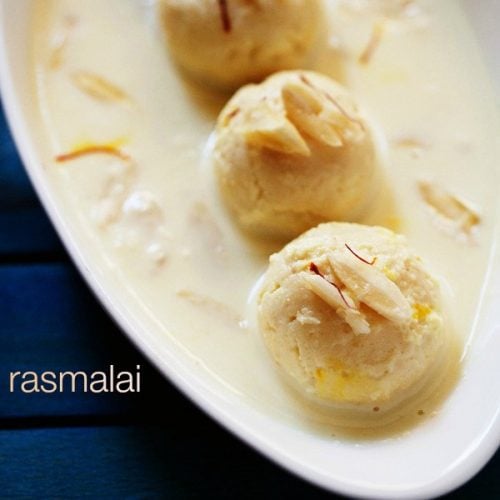
Rasmalai Recipe | Rasmalai Sweet
Ingredients
- 12 to 15 Rasgulla – homemade or store brought ones
- 1 litre whole milk
- 4 to 5 tablespoons sugar or add as required
- 10 to 12 almonds unsalted – blanched
- 10 to 12 pistachios unsalted – blanched
- ½ cup water for blanching the almonds and pistachios
- ½ teaspoon green cardamom powder
- 1 to 2 teaspoons rose water or kewra water (pandanus water)
- 8 to 10 saffron strands
- few saffron strands – for garnish
Instructions
Preparation
- To make rasmalai you will need 12 to 15 rasgulla. Either you can buy them from stores or make them at home.
- Boil ½ cup water. Then add almonds and pistachios. Cover and keep aside for 30 to 40 minutes.
- Later peel the almonds, pistachios and slice them finely. Set aside.
Thickening milk to make rabdi
- When the almonds are blanching, take milk in a thick bottomed pan or kadai.
- Bring the milk to a boil on medium heat stirring at intervals.
- Whilst the milk is coming to a boil, take 2 tablespoons of milk from the pan in a small bowl.
- Let this milk become warm. Add crushed saffron strands. Stir and keep aside.
- Once the milk has come to a boil, then lower the heat and simmer the milk. Collect the floating clotted cream (malai) on the sides. Continue to cook this way till the milk is reduced to half.
- Keep on collecting the cream which floats on the top and move it to the sides. Also keep on stirring the milk at intervals so that the milk does not get scorched at the bottom.
- Add sugar and stir well so that the sugar dissolves.
- Then add cardamom powder.
- Add the blanched and sliced almonds and pistachios. Reserve a few almonds and pistachios for garnishing.
- Also add the saffron infused milk.
- Stir again. Keep simmering the reduced milk at a low heat.
Making rasmalai
- Take each rasgulla and with a spatula and apply pressure, so the excess sugar syrup is removed from it.
- You can also press and squeeze each rasgulla in your palms. Be gentle and don't apply too much of pressure. As then the rasgullas will break. Repeat with all the rasgulla balls.
- Now place the rasgulla in the simmering milk and simmer for 2 to 3 minutes on a low heat.
- Switch off the heat and then add rose water or kewra water (pandanus water).
- Stir gently. Cover and let the rasmalai come to room temperature. Then chill in a covered container or bowl.
- Serve garnished with blanched, sliced almonds or pistachios that were kept aside and a few saffron strands.
- You can also serve rasmalai warm or at room temperature.
Notes
- If using tinned or store-brought rasgulla, then make sure they are fresh and in their shelf period.
- For making the thickened milk or rabdi, use whole milk. You can also use homogenized and pasteurized milk.
- Refrigerate the rasmalai in a covered container. It keeps well for 2 to 3 days in the fridge. So you can make ahead this dessert a few days before serving.You can also make the rasgulla first and refrigerate them for a couple of days.
- For the nuts, you can add almonds, cashews, pine nuts and pistachios.
- For the flavorings you can skip any one or try to have your own combinations from – green cardamom powder, saffron, rose water or kewra water.
- The recipe can be scaled up for a larger serving.
Nutrition Info (Approximate Values)
This Rasmalai Recipe from the archives was first published in January 2015. It has been updated and republished in February 2024.
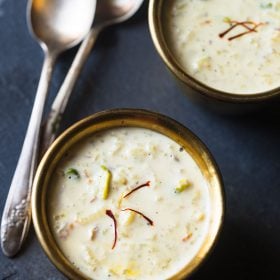
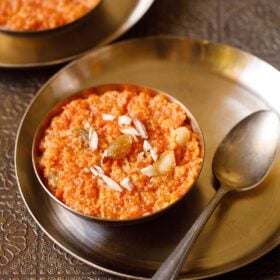
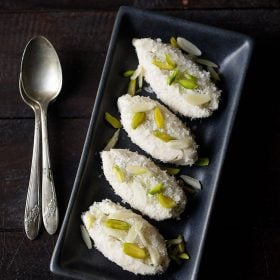
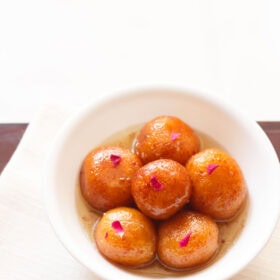
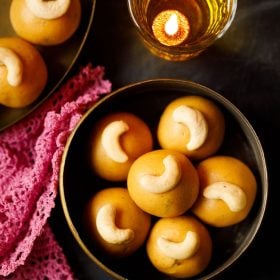
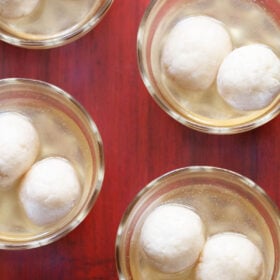
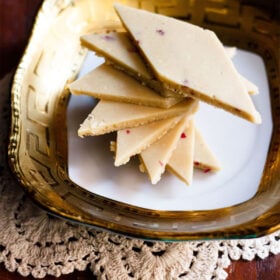








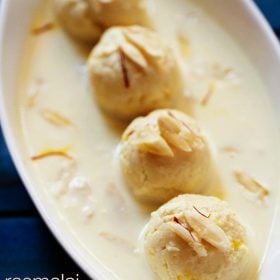
i really have to give this one a try !! looks too good !! fingers crossed
Mam you are just awesome. I tried this receipe and it turned out so well. I follow your blog religiously for all my cooking.
hi puja, thank you for this lovely feedback on rasmalai recipe. glad to know.
Hi Dassanna, I am your regular follower. I had a query.. Is it necessary to boil the rasgulla in sweetened milk. Can we just the rasgulla in sweetened milk.
Thanks in Advance 😊
Yes you can do that but simmering for a few minutes in the flavored sweetened milk makes them absorb the sweetness and flavors. Welcome.
Mam, we use pasteurized cow’s milk to prepare rasmalai?
yes you can.
Hi Dassana,
You have mentioned that the water that remains after making chenna can be used for making chapatis or other stuff. How long can we store this water in the fridge?
Linda, it will stay good for 2-3 days in fridge.
Which is the best saffron(kesar) ?
Which one did you use in this recipe..there r so many brands confused with dem..plz suggest the best
currently i am using patanjal’s saffron. but for this recipe i had used taj mahal saffron.
Hi dear,
I am a regular visitor of ur blog and tried many of ur recipes. thanks for ur guidelines.. can u pls tell me the shelf life of rasmalai and sandhesh kept under refrigeration as i want to prepare in advance.
jayanthi, both stay good for about 2 to 3 days in the fridge. i would suggest you to prepare 1 to 2 days before.
Thanks for ur reply dear 🙂
welcome jayanthi.
Hi…
Thank you for lovely recipe.. I made ras gully for first time,It was spongy n yummy,.. Then I tried res malai,also for first time..I was nice.. Except one thing,it’s smoky in taste, I hv added elaichi n dalchini,then..???
Plz give corrections..
thanks farhat. elaichi powder is added. dalchini or cinnamon powder is not added. the smoky flavor is due to the dalchini powder. just add a bit more of elaichi powder to balance this smoky flavor of dalchini.
Thank you very much for this lovely recipe. I tried this out for Ganesh Chaturthi and it was awesome. It turned out very well. Everyone liked it. It was tasting better than what we get outside. Superb.
Welcome Mansi. Glad to know that you liked rasmalai recipe. Thanks for your positive review.
I love all ur receipes and they turn out exactly the way they r suppose too. I doubt if i wud b visiting or have visited any other receipe site in last 1 year . Superb.
lovelee very pleased to know this thank you for your positive and encouraging feedback 🙂
Thanks for the recipe… it was awsum… ? but i want to know can we use the rest rasmalai milk in another dish.
Welcome Shanu. You can just drink it. its a sweet milk.
I just made the rasmalai with the homemade rasgulla and it tastes amazing. If fact it tastes better than the shops, so thank you very much.
glad sumayyah you liked the rasmalai recipe 🙂 thankyou so much.
Hello… This looks yum… I want to try this… But saffron is not easily available in stores around me.. How can I make this without saffron ?
skip the saffron neha.
How to make rasgullas
aman you could check rasgullas recipe from the blog.
Love it . I also made homemade rasgulla and they wete nice spongy and mouthwatering . Everyone liked them. Now gonna make rasmalai out of remaining ones. I wonder the rasgullas we get from sweet shops are not spongy . They are dry ones which they pack in boxes. I think they aren’t spongy rasgullas there may be variations in making them . What actually they are and how they can be prepared.
good to know that harsimrat that the rasgullas turned out great. whenever you try any recipe and there is a positive feedback, i feel good. because i know you put a lot of effort and keep on trying. there are many variations. there is a spongy and there is non spongy version too. they are all made from chenna but the other ingredients that go, the cooking method and time differs.
Hyy .. I tried this recipe using readymade rasugallas… And it turned out to be soooo tastyyy … Thank you for this awesome and easy recipe … Loved itttt … :*
welcome ridhima. thanks for sharing positive feedback.
Some namkeen taste come in rasmalai but can’t find where it’s come from.please give solution if possible.
rohit, did you added any salted dry fruit like salted pista. that could be the reason.
Hi.. Read lot of your interesting recipes… Also made rasgullas.. Really turned out well.. It’s request if u cud gv receipe of gur rasmalai which is famous of Calcutta… I Wud be highly grateful
thanks archana. i have noted down the recipe request. i will try to add but there is a big pending requested recipe list.
Hi.. my rasguallas were quite soft when they were simmering..but when i added them to the reserved sugar solution and added the remaining solution ,they became hard :/ why did this happen ?
Ps – Thanks a lot for your wonderful recipes.. really helps a lot 🙂
thanks ayesha. possibly the remaining sugar solution which is added right at the end, must have been hot or slightly hot. its should be lukewarm or at room temperature. this must have hardened the rasgullas. i don’t see any other reason.
Hi dassana after the jam receipe I tried rasgulla n a huge thanks to u the step by step details of the receipe really helped me to make perfect rasgullas at one go they are very soft spongy n of course tasty they r my favorite so I will prepare them frequently thanks to u again also rasmalai is my favorite n shall soon try it
I also have tried kaju katli many times but I m not getting right texture n soft katli can u help me
welcome bhawana. thanks for the feedback on rasgulla. i don’t know where you are going wrong in kaju katli becasue many readers have tried the recipe successfully. you can let me know what goes wrong so that i can help you out.
Last time also i commented on your recipes .. you know ..
Just mind blowing recipes
princess, thanks again for sharing this positive feedback on recipes.
Wow dear !!
Amazing experience with you …
You always share awesomeeee recipes ..
I just love them ..
All are simple + tasty and most important that they are checked ..
I mean you try them and then younshare then with pics .
Truly appreciating ..
Thank you so much ..
Keep sharing ☺
welcome princess. glad to read your positive feedback.
Please give me recipe to make chakli with rice flour and urad dal powder, i tried but they turned out soft not crispy
zeenat, i can not give the recipe like this because i always try the recipe and then post it. i will add this version also in coming months.
hi Dasna, thanks for the recipe of rasmai. I tried and it was yummy. but the rasgullas were soft and bigger on the first day. next day when I removed it from the frize, they became little bit harder and smaller. y so ? pls reply
when refrigerated the rasgullas do become slightly dense, but they don’t become hard. its the same reason when we keep paneer in the fridge, they become dense or hard.
is it because I prepared rasgulla also at home only ? should I bring readymade rasgulla ?
homemade or readymade rasgullas do not make a difference. if some issue has happened with the homemade rasgullas, then they can become hard. you can try rasmalai with readymade rasgulla too.